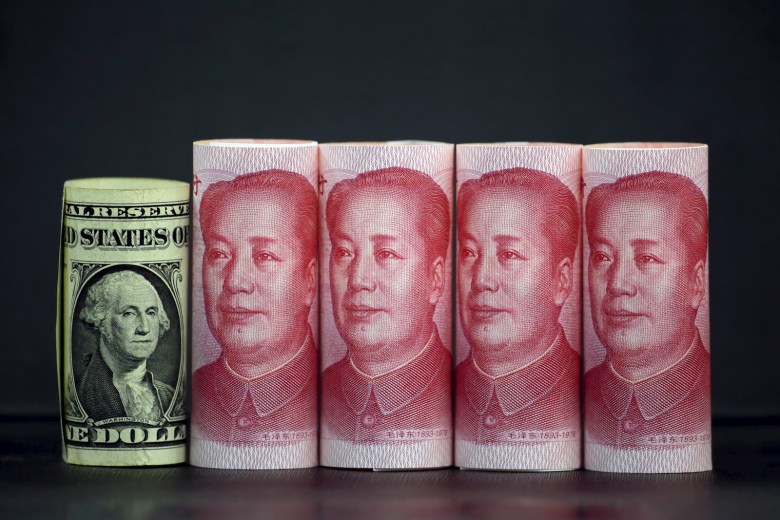The 800-pound gorilla in the room when Joe Biden goes toe-to-toe with Xi Jinping on November 15 will be the extreme political dysfunction in Washington that is threatening America’s last AAA credit rating.
As US President Biden angles to remind Chinese leader Xi who’s boss in San Francisco, partisan brinkmanship 3,000 miles away in Washington is reminding global markets that the world’s biggest economy is in a rather bad place.
The threat Biden faces is less from Asia’s top trading power than lawmakers on Capitol Hill in burn-it-all-down mode.
Moody’s Investors Service just reminded Biden’s White House that the stakes are rising, and fast. On November 10, the last credit rating company to grade Washington AAA warned a downgrade is coming, and perhaps soon. Moody’s cited the US debt topping US$33 trillion and political polarization throwing fiscal management into chaos.
This adds an awkward subplot to the Biden-Xi tete-a-tete on the sidelines of this week’s Asia-Pacific Economic Cooperation (APEC) summit. For all the challenges Xi faces in Beijing — slowing growth, property sector defaults, deflation, aging demographics — Biden faces his own daunting odds in stopping Moody’s from dealing his administration a humiliating blow.
And at a time when global financial markets were just warming to the idea that the US Federal Reserve might be done tightening this inflation-curbing cycle. A downgrade would take the “higher-for-longer” yield era to entirely new heights of economic damage and disorientation.
White House officials claim, somehow with straight faces, that this drama isn’t casting a pall over US-China dynamics in San Francisco. “We don’t have any changes to his schedule,” White House press secretary Karine Jean-Pierre told reporters this week. “This is something that Congress can get done very easily. This is their job, right? Their job is to keep the government open.”
But tell that to officials at Xi’s State Administration of Foreign Exchange (SAFE) managing China’s $860 billion worth of US Treasury holdings. Though this is Beijing’s lowest exposure to US political shenanigans in 14 years, it entrusts a sizable block of state savings to Washington lawmakers acting rationally.

This year’s surge in US yields to 17-year highs is disproportionately affecting China’s investment and trade-reliant economy. The 5.7% drop in the yuan this year raises the risk of more property developers defaulting on overseas debt dominated in dollars.
The US economy, meanwhile, is buckling under the weight of 11 Fed rate hikes in less than 20 months. Germany is fending off chatter that it’s the “sick man” of Europe as the rest of the continent loses economic altitude. Economists forecast that Japan’s economy shrank in the July-September period.
This global backdrop adds pressure on Xi’s team to support demand in the short run, while also stepping up structural reforms to improve the quality of China’s long-term growth. A fresh surge in US yields, particularly if Moody’s pulls the trigger, could slam global markets in the homestretch of 2023.
In this sense, political dysfunction in the US is emerging as the biggest threat to Asia’s 2024. “In Moody’s view, such political polarization is likely to continue,” the agency said. “As a result, building political consensus around a comprehensive, credible multi-year plan to arrest and reverse widening fiscal deficits through measures that would increase government revenue or reform entitlement spending appears extremely difficult.”
Analysts at Moody’s cited a number of recent standoffs that augur poorly for Republicans and Democrats coming together to address Washington’s fiscal challenges. They include a near-default earlier this year as Republicans refused, for a time, to raise the statutory debt limit.
That clash led to the ouster of Kevin McCarthy, a Republican, as speaker of the House of Representatives, the first such stunt by Congress in history. It left the House leaderless and rudderless for weeks, feeding into the negative sentiment at Moody’s on US fiscal vulnerabilities. It also upped the odds of yet another government shutdown.
The specter of lawmakers effectively shuttering Washington prompted Fitch Ratings to downgrade the US in August. Fitch cut America’s rating to AA+, 12 years after S&P Global yanked away its AAA status amid an earlier budget showdown.
The days since Moody’s fired its bow shot at Capitol Hill haven’t been promising. New House Speaker Mike Johnson has yet to outline a path forward for avoiding another shutdown. One will indeed occur if Congress fails to pass a budget or stopgap-funding bill by November 17.
Troubling, too, is the gimmicky ways in which Johnson is looking to paper over Washington’s dysfunction. One is passing a “laddered continuing resolution.” This would only extend funding for certain government agencies and programs until January 19, and for others until February 2.

Senator Chris Murphy, a Connecticut Democrat, speaks for many when he calls the strategy “extreme” and “just a recipe for more Republican chaos and more shutdowns.”
Proceeding this way, Murphy warns, means “that the House process requires you to come back and deal with half the budget on one date and half the budget on another date.” Murphy dismisses it as “a little bit of a recipe for failure.”
Nor are close observers of Washington’s fiscal mechanics impressed. “This punt delays [progress] until the first quarter of 2024, rather than resolves, the standoff over spending levels and priorities,” says Benjamin Salisbury, director of research at Height Capital Markets.
Analyst Chris Krueger at TD Cowen Washington Research calls the contours and effectiveness of such a plan a “total mystery.” What’s more, he says, credit rating companies understand that hardline Republicans have made passing 12 different funding bills to keep the government open, rather than an omnibus spending measure, a “cause celebre” this year.
As global markets hang in the balance, this “overly-complex” answer to a simple problem is likely to face strong pushback in the Senate, says Isaac Boltansky, strategist at BTIG Research.
“All said,” Boltansky notes, “the new Speaker is facing the same complicated calculus as the old Speaker and the only thing that has changed is that more than a month of the legislative calendar has been wasted.”
Xi would be wise to broach the issue with Biden. Though Japan has the biggest stockpile of US government debt at $1.1 trillion, China’s huge $860 billion exposure has to worry Communist Party bigwigs in Beijing.
Raising such concerns is also a way for Xi to remind Biden that China has unique leverage over Washington. It’s unlikely that Beijing would dump its dollars wholesale as the resulting panic in global markets would quickly boomerang back on China’s economy. Surging yields would hurt American consumers’ finances, reducing demand for Chinese goods. Still, it’s an option.
Another reason to worry: Donald Trump’s attempt to win back the White House. Should Trump win a second term in November 2024, hitting China with fresh trade sanctions would likely be a top priority. Trump and his inner circle have in the past threatened to default on US debt to hurt Beijing.
This works both ways, of course. A Moody’s downgrade might trigger Asian policymakers’ PTSD. Back in August, Fitch’s downgrade sent ripples through markets but not quite shockwaves.
At the time, Fitch said: “The rating downgrade of the United States reflects the expected fiscal deterioration over the next three years, a high and growing general government debt burden, and the erosion of governance relative to ‘AA’ and ‘AAA’ rated peers over the last two decades that has manifested in repeated debt limit standoffs and last-minute resolutions.”
The message clearly wasn’t received on Capitol Hill, where lawmakers are still playing games with America’s status as defender of the global reserve currency. Yet the specter of Moody’s piling on could shake markets. Might it also have S&P wondering if it’s time to give a second look at the AA+ rating at which it has held the US since 2011?
Additional turmoil emanating from the US is the last thing North Asia’s newish central bank leaders need. Governor Kazuo Ueda only took the helm at the Bank of Japan in April; People’s Bank of China Governor Pan Gongsheng in July. For both, 2024 is looking more precarious by the day.
Right out of the gate, Pan has had to confront a worsening economic slowdown, a slip back to deflation, a property sector in crisis, record youth unemployment and foreign capital fleeing at record speed.

Tumbling home sales are adding to already extreme pressures on developers grappling with a multi-year credit crisis. On November 13, Fitch said it was withdrawing all ratings on China’s Country Garden Services Holding. Fears of a Country Garden default in recent months have #ChinaEvergrande trending on global search engines and social media again.
Moody’s economist Madhavi Bokil warns that “we see downside risks to China’s trend growth on account of structural factors.” In the shorter run, Bokil thinks Beijing’s stimulus efforts to date could help China grow 5% this year.
“Third quarter data shows a modest improvement in economic activity that was helped by policy support, including infrastructure spending, interest rate cuts, stimulus directed at the property sector and some stabilization on the external front,” he says.
Bokil’s team sees China growing at a roughly 4% pace in both 2024 and 2025. Yet as US Treasury Secretary Janet Yellen said after discussions with APEC finance ministers, China’s troubles present a “downside risk” to the region. Yet so is the US, as Moody’s is reminding a global economy on edge.
Follow William Pesek on X, formerly Twitter, at @WilliamPesek

